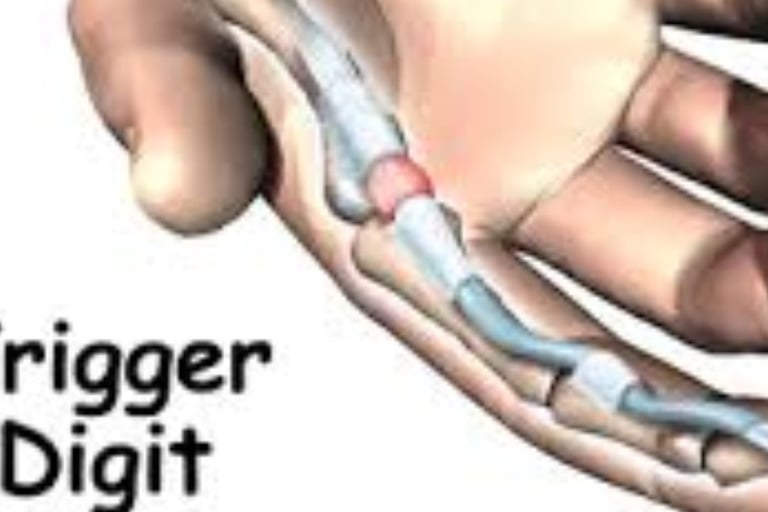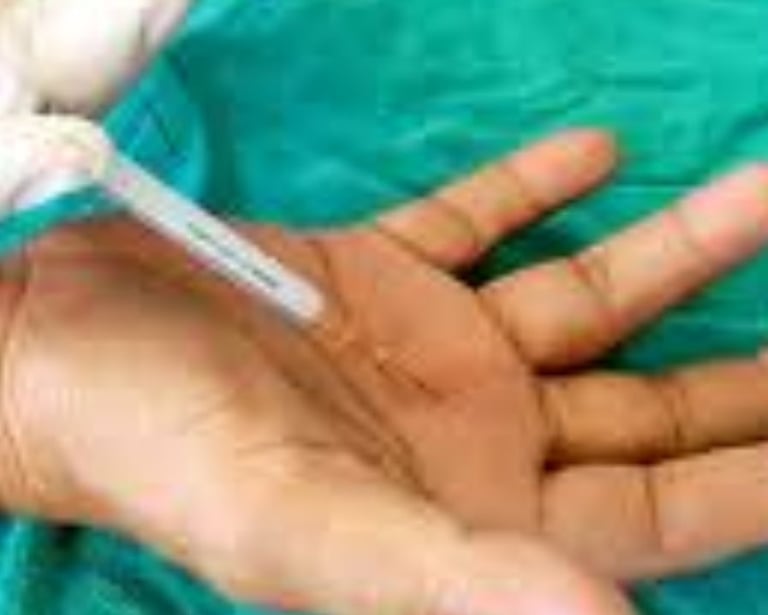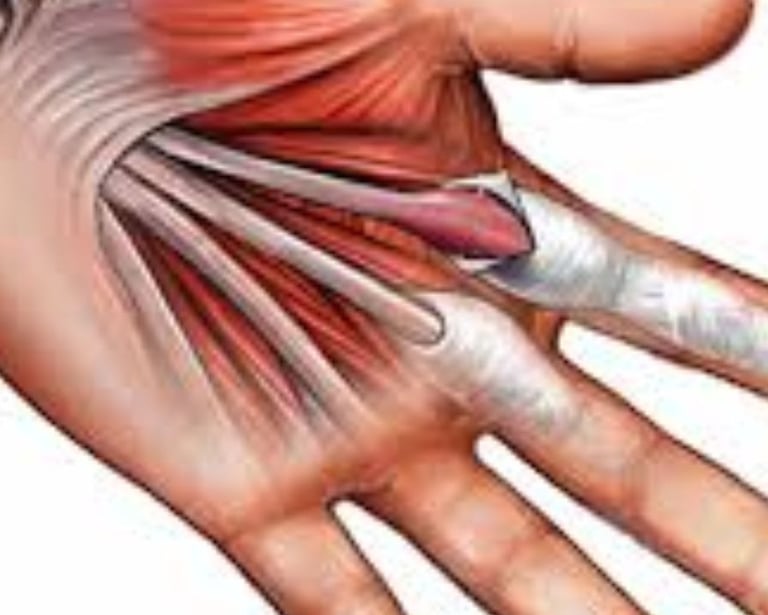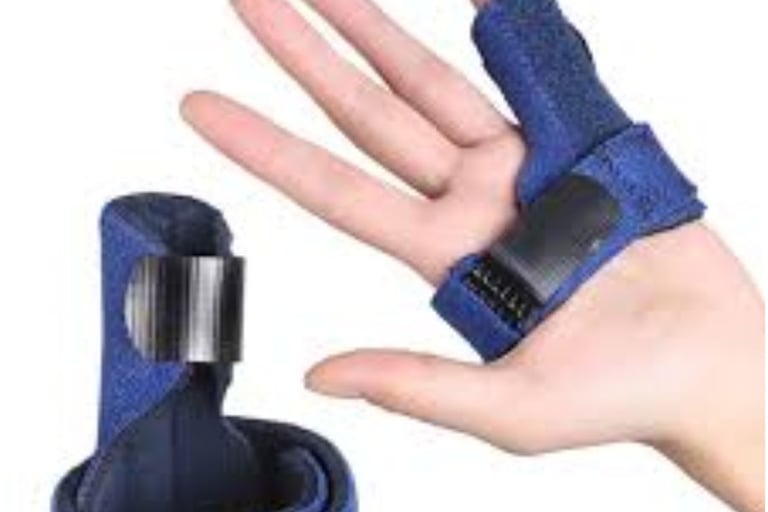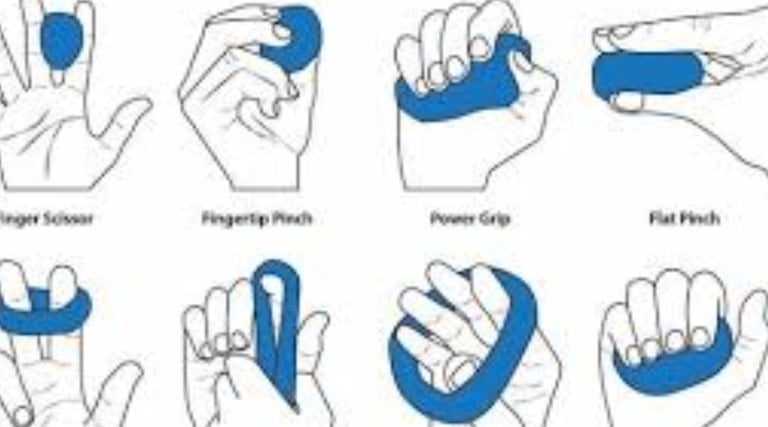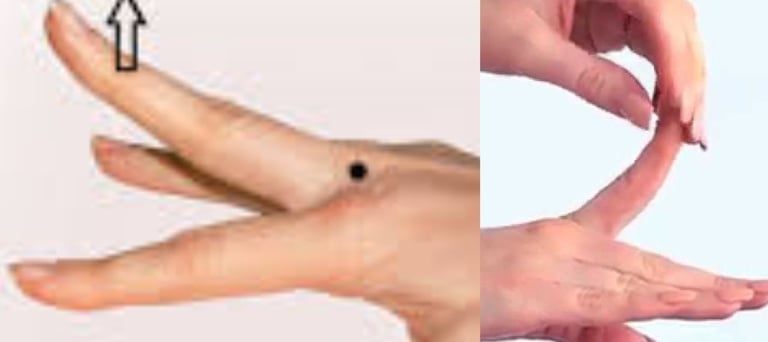
Health is a crown on the heads of the healthy that only the sick can see.

🤲 Trigger Finger & the Role of Voluntary Fasting: A Natural Healing Approach
Discover how safe, daily exercises can reduce stiffness, pain, and locking in trigger finger by improving tendon mobility and circulation.💪🖐️ role of voluntary fasting on natural healing
MUSCULOSKELETAL
6/21/2025


🤲 Trigger Finger & the Role of Voluntary Fasting: A Natural Healing Approach
Discover how safe, daily exercises can reduce stiffness, pain, and locking in trigger finger by improving tendon mobility and circulation.💪🖐️ role of voluntary fasting on natural healing
Trigger finger (stenosing tenosynovitis) is a condition where a finger gets stuck in a bent position and snaps straight with a pop—like pulling a trigger.
It’s caused by inflammation and thickening of the tendon sheath in the finger.
While conventional treatments include rest, splints, steroid injections, or surgery, voluntary fasting may offer natural support by addressing the root causes: inflammation and metabolic stress.
🔍 What Causes Trigger Finger?
Cause/Factor
How It Contributes
🔥 Inflammation
Swells the tendon sheath
🩸 Diabetes or high blood sugar
Affects tendon flexibility and healing
🤲 Repetitive finger use
Irritates the tendons over time
🧬 Hormonal/metabolic imbalance
Can lead to chronic tissue irritation
🌙 How Voluntary Fasting May Help
Voluntary fasting (like intermittent fasting or Sunnah fasting) may help reduce the triggers behind trigger finger by:
✅ 1. Reducing Systemic Inflammation
Fasting lowers pro-inflammatory markers such as CRP and IL-6
May ease swelling in the tendon sheaths
✅ 2. Improving Blood Sugar Control
Fasting increases insulin sensitivity, especially beneficial for diabetics
Reduces glycation (sugar sticking to proteins), which stiffens tendons
✅ 3. Activating Autophagy
Helps the body repair and recycle damaged tissue, including in joints and tendons
✅ 4. Promoting Weight Loss
Less weight means less pressure on joints and better hormonal balance
✨ "Fast and you will gain health" — Prophet Muhammad ﷺ (Sunan Ibn Mājah)
🧠 Additional Holistic Tips:
🌿 Anti-inflammatory diet (turmeric, ginger, omega-3s)
💧 Hydration + magnesium-rich foods
👐 Gentle stretching & physical therapy
⛔ Avoid repetitive gripping (until healing occurs)
📝 Meta Description (SEO-Friendly):
🤲 Trigger Finger Relief Through Voluntary Fasting?
Learn how fasting may help reduce inflammation, improve tendon health, and support natural healing in trigger finger—especially in people with diabetes or joint issues. 🌙🦴
Would you like a daily fasting plan, healing checklist, or duas for joint pain?
🧠 What Happens Inside the Finger?
Each finger tendon passes through a protective sheath.
In trigger finger, that sheath becomes inflamed or thickened, making it harder for the tendon to glide smoothly.
✅ Treatment Options:
🧘 Conservative (Early Stage):
Rest the affected finger
Warm compresses or gentle stretches
Anti-inflammatory foods (turmeric, ginger, leafy greens)
Finger splints at night
💉 Medical:
Steroid injections to reduce inflammation
Physical therapy to improve movement
Surgery (if other methods fail) to release the sheath
🤲 Trigger Finger and the Role of Exercise: Move to Heal
Trigger finger (stenosing tenosynovitis) is a condition where one or more fingers lock, click, or catch when bent or straightened, often due to inflammation or thickening of the tendon sheath in the hand.
While rest and medical treatment are important, exercise plays a key role in managing symptoms and preventing stiffness.
🧬 Why Exercise Helps Trigger Finger
Benefit of Exercise
How It Helps
🔄 Improves tendon gliding
Reduces catching or locking sensation
💧 Increases blood flow
Promotes healing and reduces inflammation
💪 Maintains strength and motion
Prevents joint stiffness and muscle loss
🧘 Relieves tension
Reduces pain and improves hand function
🤲 Recommended Exercises for Trigger Finger
✅ Gentle is key — exercises should never cause sharp pain or force the finger.
1. Finger Tendon Glides
Move fingers through their full range of motion to keep tendons smooth.
Start with fingers straight
Make a hook fist
Then a full fist
Return to straight
Repeat 5–10 times, 2–3x daily.
2. Rubber Band Resistance
Place a rubber band around your fingers and thumb
Slowly open your fingers against the band’s resistance
Hold for 3–5 seconds, relax
Do 3 sets of 10 reps
3. Finger Lifts
Place your hand flat on a table
Lift one finger at a time slowly, then lower
Repeat 2 sets of 10, alternating hands if needed.
4. Warm Compress + Stretching
Before exercise, apply warm compress for 10 minutes to relax tissues.
Afterward, gently stretch the affected finger backward and forward, holding each stretch 10–15 seconds.
⚠️ When to Avoid Exercise
During acute pain or severe inflammation
If exercises worsen clicking or locking
If your doctor advises rest or splinting first
🏃♂️ General Tips
Combine with anti-inflammatory diet (e.g., turmeric, omega-3s)
Avoid repetitive gripping or vibrating tools
Wear a night splint if stiffness is worse in the morning
Stay consistent — daily gentle movement works best
📝 Meta Description (SEO-Friendly):
🤲 Trigger Finger & Exercise: Gentle Moves for Natural Relief
Discover how safe, daily exercises can reduce stiffness, pain, and locking in trigger finger by improving tendon mobility and circulation.💪🖐️
📝 Meta Description (SEO-Friendly)
🤲 Trigger Finger: What It Is & How to Treat It Naturally
Learn the causes, symptoms, and treatment options for trigger finger—plus how lifestyle changes like fasting and anti-inflammatory remedies may help soothe and heal it.
🤲 Trigger Finger & Exercise – FAQs
❓
1. What is trigger finger, and how does it happen?
Trigger finger occurs when the tendon in your finger becomes inflamed or irritated, making it hard for the tendon to glide smoothly through its sheath.
This causes clicking, locking, or pain when you bend or straighten the finger.
❓2. Can exercise really help trigger finger ?
Yes. Gentle exercises can reduce stiffness, improve tendon movement, and promote healing by increasing blood flow.
However, exercise is most effective in mild to moderate cases, or after inflammation is under control.
❓3. Which finger exercises are best?
Tendon gliding
Rubber band resistance
Finger lifts
Stretching after a warm compress
These are low-impact and promote smooth motion of the tendon.
❓4. When should I avoid exercising my trigger finger?
Avoid exercise if:
Pain is sharp or worsening
Finger is locked in a bent position
There’s severe swelling or heat
You’ve just received a steroid injection or are post-surgery (check with your doctor)
❓5. Can exercise cure trigger finger completely?
In early stages, exercise combined with rest, warm compresses, and anti-inflammatory habits may resolve symptoms.
In chronic or severe cases, it may only reduce symptoms — not eliminate them.
❓6. How often should I do the exercises?
Start with:
2–3 times daily for 5–10 minutes
Repeat each movement 5–10 times
Always stop if pain increases.
❓7. Are there other natural remedies to use alongside exercise?
Yes! These include:
🧴 Warm compresses
🌿 Anti-inflammatory foods (ginger, turmeric, omega-3s)
🖐️ Night splints
🧘 Stress-reduction techniques (to prevent clenching)
❓8. When should I see a doctor?
See a healthcare provider if:
The finger stays locked
There is no improvement after a few weeks
You're unable to perform daily activities
You experience severe pain or swelling
❓9. Can voluntary fasting really help trigger finger?
Yes — indirectly. While fasting doesn’t “cure” trigger finger, it may reduce systemic inflammation, improve cellular repair through autophagy, and support the body’s natural healing process — all of which may help relieve tendon-related conditions like trigger finger.
❓10. What’s the link between inflammation and trigger finger?
Trigger finger is often caused by inflammation of the tendon sheath, leading to narrowing and stiffness.
Fasting has been shown to lower pro-inflammatory markers like CRP and IL-6, which may help reduce swelling and pain in the affected finger.
❓11. How does fasting promote healing in the trigger finger?
Fasting may:
🔥 Reduce inflammatory cytokines
🔄 Activate autophagy (cell cleanup and repair)
🧬 Improve insulin sensitivity, lowering chronic inflammation
⚖️ Balance hormones related to tissue health and pain
❓12. Is there scientific evidence that fasting helps tendon health?
While there’s limited direct research on fasting and tendonitis, studies on fasting’s anti-inflammatory and regenerative effects suggest it can benefit connective tissue recovery — including tendons and ligaments.
❓5. What type of fasting is recommended?
Voluntary intermittent fasting (e.g., 16:8 or 18:6)
Sunnah fasting on Mondays and Thursdays
Dry fasting in moderation (like during Ramadan) may also reduce inflammation
Always ensure proper rehydration and nutrition between fasts.
❓ 13. Should I continue finger exercises while fasting?
Yes — light stretching and mobility exercises are beneficial during fasting, especially:
After iftar when you’re rehydrated
During the day if swelling is reduced and pain is manageable
❓7. What foods should I eat after fasting to support healing?
Break your fast with:
🥦 Anti-inflammatory foods (leafy greens, turmeric, berries)
🐟 Healthy fats (olive oil, omega-3s)
🥜 Magnesium-rich nuts and seeds
💧 Plenty of fluids to rehydrate tissues
Avoid:
🚫 Sugars, fried foods, or refined carbs — these increase inflammation.
❓14. Are there Islamic teachings that support fasting for healing?
Yes. The Prophet ﷺ said:
"Fast and you shall be healthy." — (Hadith – Ibn Majah)
This aligns with modern insights on fasting’s regenerative effects and its potential to reduce illness caused by chronic inflammation.
❓15. When should I not rely on fasting alone?
If your trigger finger:
Becomes locked or immobile
Is accompanied by severe pain or swelling
Does not improve after several weeks of combined care
You should consult a healthcare professional for advanced care or injections.
❓16. Can fasting prevent trigger finger from coming back?
Possibly. By reducing inflammation, weight, and repetitive strain, fasting — combined with healthy habits and stress reduction — may reduce recurrence, especially in people prone to metabolic or inflammatory conditions.
keywords
Voluntary fasting may offer a natural approach to managing trigger finger, also known as stenosing tenosynovitis, by reducing inflammation, supporting tendon healing, and promoting autophagy. Many people explore natural treatments for trigger finger to avoid surgery, and studies suggest that fasting for inflammation and joint pain relief can be effective, especially when combined with a healthy diet. This approach aligns with Sunnah fasting practices, which may also help reduce hand stiffness, improve tendon sheath health, and provide holistic support for tendon inflammation relief. By incorporating intermittent fasting, individuals may find relief from finger pain and support long-term healing without medication.
✍️ About the Author
Hassan Al-Warraqi is the founder of H-K-E-M.com and a dedicated health content creator specializing in natural, evidence-based approaches to chronic conditions. His work bridges traditional wisdom and modern science, with a focus on metabolic health, inflammation, and fasting as a healing tool.
In this article, Hassan sheds light on Trigger Finger, exploring how voluntary fasting may support tendon health, reduce inflammation, and promote natural recovery without invasive intervention.
🖋️ By Hassan Al-Warraqi
Founder of H-K-E-M.com | Exploring fasting, inflammation & natural tendon healing 🤲🌿
